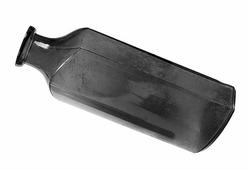
Ellen Campbell-Grizzle The substance pseudoephedrine (soo doe eh FEH drin) used to be a most popular and powerful decongestant found in commonly used cough and cold products. It is chemically related to the amphetamine class of drugs. The substance works by shrinking blood vessels in the nose, lungs and other mucus membranes, decreasing blood flow and congestion and opening up the airways.
This action produces relief for stuffy nose, nasal and sinus congestion. Precautions must be taken by persons with high blood pressure, heart disease, thyroid problems, diabetes, glaucoma, enlarged prostate, liver or kidney disease. Despite intense lobbying from the distributive sector, Jamaican regulatory authorities have consistently restricted the sale of these products through pharmacies only. In fact, for many years, the Jamaican position on this drug differed from most major regulatory jurisdictions. Then, other problems related to pseudoephedrine use and abuse, surfaced.
The ecstasy problem
Substance abusers in Europe and the United States found a simple way to make ecstasy and methamphetamine in their kitchens. Pseudoephedrine is an essential ingredient in this process and its diversion to this illicit market has mushroomed.
In countries like New Zealand, the substance was reclassified and pharmacists are mandated to inform the police whenever such products are sold. On March 9, 2006, President George Bush signed the Combat Methamphetamine Epidemic Act of 2005 which was included in the Patriot Bill. The Act is enforced by the Drug Enforcement Agency (DEA) and bans the free sale of cold medicines that contain the ingredient psuedoephedrine in the United States. Under the Act:
Sales must be made from 'behind the counter' in a pharmacy. Placement must be in a secure location in the prescription-fillingarea or in a locked cabinet in the facility to which customers do not have direct access.
The amount that an individual may purchase each month is limited.
Individuals must present photo identification to the pharmacist before a sale can be made.
Pharmacies are required to keep personal information about purchasers for two years.
Pseudoephedrine is now listed as a precursor chemical in the making of an illicit drug. Jamaica continues to maintain the position that cough-cold products containing pseudoephedrine must be sold in a pharmacy, behind the counter.
Drug Industry reactions

The reaction of the pharmaceutical manufacturers and distributors to the impending demise of pseudoephedrine is mixed. One international pharmaceutical company operating in Jamaica recently announced the distribution of its brand to registered pharmacies only. Some manufacturers, recognising that these 'extra steps' may discourage people from buying cough/cold remedies, are replacing pseudoephedrine with phenylephrine. Others are reformulating products so that they contain no amphetamine like substances.
What should the informed consumer do?
Examine your cough-cold preparations to see if they contain pseudoephedrine and discuss with your pharmacist or doctor whether you can take the product. Persons 60 years and over are more likely to experience side effects and may need a lower dose of medication. A short-acting formulation (not a long-acting or controlled-release form) is recommended if you are over 60 years of age.
If you are breast feeding, remember pseudoephedrine passes into breast milk.
Do not crush, chew or break any extended-release, timed-release or 12-hour products. Swallow them whole as they are specially formulated to release slowly into the body
Never take double doses of these products.
Remember, pseudoephedrine may cause dizziness and drowsiness. Use caution when driving, operating machinery or performing other hazardous tasks. Elite athletes should avoid the use of these pseudoephedrine-containing products as the substance is included in the list of banned substances published by the International Olympic Committee.
Ellen Campbell Grizzle, president, Caribbean Association of Pharmacists; director, Information & Research, National Council on Drug Abuse; email: yourhealth@gleanerjm.com.
